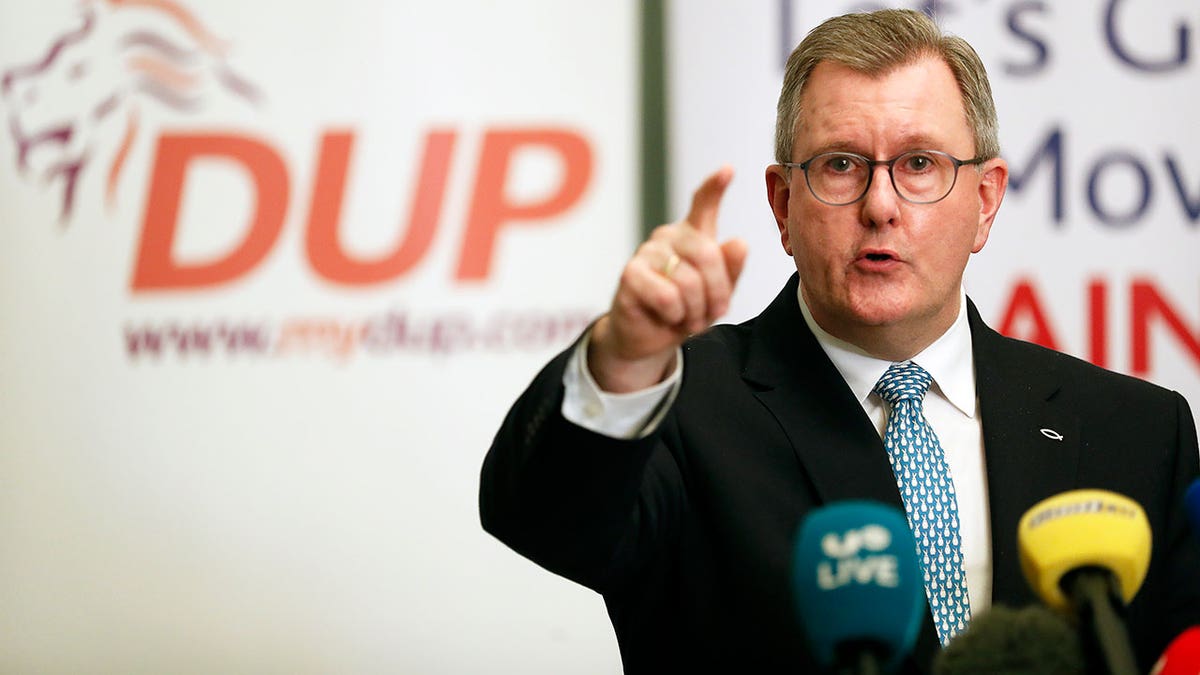Ireland senator says ‘rights’ are ‘restricted’ for the ‘common good’
Ireland senator weighs in on bill to ‘restrict’ speech for the ‘common good.' (Credit: Houses of the Oireachtas, June 13, 2023)
- The Democratic Unionist Party, Northern Ireland’s largest British unionist party, has agreed to end a boycott that lasted two years.
- The breakthrough follows a deadline set by the U.K. government, urging Northern Ireland politicians to restore the Northern Ireland Assembly.
- The party's boycott, triggered by a disagreement over trade rules in February 2022, left Northern Ireland without a functional administration.
Northern Ireland’s largest British unionist party has agreed to end a boycott that left the region’s people without a power-sharing administration for two years and rattled the foundations of the 25-year-old peace. The breakthrough could see the shuttered Belfast government restored within days.
After a marathon late-night meeting, Democratic Unionist Party leader Jeffrey Donaldson said Tuesday that the party’s executive had backed proposals to return to the government. He said agreements reached with the U.K. government in London "provide a basis for our party to nominate members to the Northern Ireland Executive, thus seeing the restoration of the locally elected institutions."
The breakthrough came after the U.K. government last week gave Northern Ireland politicians until Feb. 8 to restore the Northern Ireland Assembly and executive or face new elections.
UK GRANTS EXTENSION FOR NORTHERN IRELAND TO REVIVE ITS COLLAPSED GOVERNMENT
"All the conditions are in place for the Assembly to return," Northern Ireland Secretary Chris Heaton-Harris said. "The parties entitled to form an executive are meeting today to discuss these matters, and I hope to be able to finalize this deal with the political parties as soon as possible."

Democratic Unionist Party leader Jeffrey Donaldson speaks to the media during a press conference at Hinch Distillery, Temple, Northern Ireland, on Jan. 30, 2024. The Unionist leader met with his executive members who have agreed to endorse a deal and restore power-sharing in Northern Ireland. (AP Photo/Peter Morrison)
The DUP walked out in February 2022 in a dispute over post-Brexit trade rules. Ever since, it has refused to return to the government with the Irish nationalist party Sinn Fein. Under power-sharing rules established as part of Northern Ireland’s peace process, the administration must include both British unionists and Irish nationalists.
The walkout left Northern Ireland’s 1.9 million people without a functioning administration to make key decisions as the cost of living soared and backlogs strained the creaking public health system. Amid mounting public frustration, teachers, nurses and other public sector workers staged a 24-hour strike this month calling on politicians to return to the government and give them a long-delayed pay raise.
The British government has agreed to give Northern Ireland more than $3.8 billion for its public services, but only if the executive in Belfast gets back up and running.
The political impasse in Northern Ireland stems from the United Kingdom's decision to leave the European Union and its borderless trading bloc after decades of membership. The DUP quit the government in opposition to new trade rules put in place after the U.K. left the EU in 2020 that imposed customs checks and other hurdles on goods moving to Northern Ireland from the rest of the U.K.
The checks were imposed to maintain an open border between the north and its EU neighbor, the Republic of Ireland, a key pillar of the peace process that ended decades of violence in Northern Ireland. The DUP, though, says the new east-west customs border undermines Northern Ireland’s place in the U.K.
In February 2023, the U.K. and the EU agreed on a deal to ease customs checks and other hurdles for goods moving to Northern Ireland from the rest of the U.K. But it was not enough for the DUP, which continued its government boycott.
Donaldson said further measures agreed by the British government will "remove checks for goods moving within the U.K. and remaining in Northern Ireland and will end Northern Ireland automatically following future EU laws."
The DUP’s decision faces opposition from some hard-line unionists, who fiercely guard Northern Ireland’s place in the U.K. and say even light-touch post-Brexit checks create a de facto internal trade barrier. Dozens of protesters gathered outside the DUP meeting venue outside Belfast late Monday, waving placards saying, "Stop DUP sellout."
Details of the supposedly private five-hour meeting were live-tweeted by Jamie Bryson, editor of the Unionist Voice newsletter, who is opposed to Donaldson’s attempts at compromise.
Donaldson said last week that he had received threats over his attempts to negotiate a return to the government.
"I think my party has displayed far more courage than those who threaten or try to bully or try to misrepresent us," he said Tuesday. "We are determined to take our place in taking Northern Ireland forward."
IRISH SENATOR UNDER FIRE FOR ADVOCATING BILL TO RESTRICT FREE SPEECH
The situation has been complicated by Northern Ireland’s changing political landscape. Unionists were the largest force in the Northern Ireland Assembly from its establishment in 1998 until 2022, when Sinn Fein won the most seats in an election.
That gives the nationalist party, which seeks to take Northern Ireland out of the U.K. and unite it with the republic, the right to hold the post of first minister. The DUP would fill the post of deputy — a bitter pill for some unionists to swallow.
Sinn Fein President Mary Lou McDonald said she was optimistic the Belfast government could return before the Feb. 8 deadline.
"It is vital there is political stability to address the scale of the crisis across our public services," she said. "Let’s now focus minds on the job at hand and to the solutions required to support workers and families who want and deserve functioning government."









































